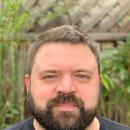Pacific Northwest Software Symposium
November 13 - 15, 2015
Rapelcgvba: Jul Vg Znggref
Sunday - Nov 15 2:15 PM PST - STUDIO 1/2
Encryption is a powerful tool for privacy. At least that is what we're meant to think.
If you consider encryption to be a black box of magic, you should probably attend this talk.
If you think encryption will protect your secrets, you should probably attend this talk.
If you have (or haven't) been following the news, you should probably attend this talk.
The truth is, encryption can be an effective way of making it harder for people to steal your secrets. But it isn't magical, it isn't fool proof and, depending on how you are using it, may be completely useless. It is a hard topic that we'll only touch the surface on, but there are very few topics that are more crucial for our industry and profession to understand better than encryption. You don't have to understand the math (although that will help), but you do have to understand what it will and won't do for you*.
*and how implementations of it may have been intentionally compromised
About Brian Sletten
Brian Sletten is a liberal arts-educated software engineer with a focus on forward-leaning technologies. His experience has spanned many industries including retail, banking, online games, defense, finance, hospitality and health care. He has a B.S. in Computer Science from the College of William and Mary and lives in Auburn, CA. He focuses on web architecture, resource-oriented computing, social networking, the Semantic Web, AI/ML, data science, 3D graphics, visualization, scalable systems, security consulting and other technologies of the late 20th and early 21st Centuries. He is also a rabid reader, devoted foodie and has excellent taste in music. If pressed, he might tell you about his International Pop Recording career.

